Life is short.
Life is short. Sometimes, we all feel our mortality keenly.
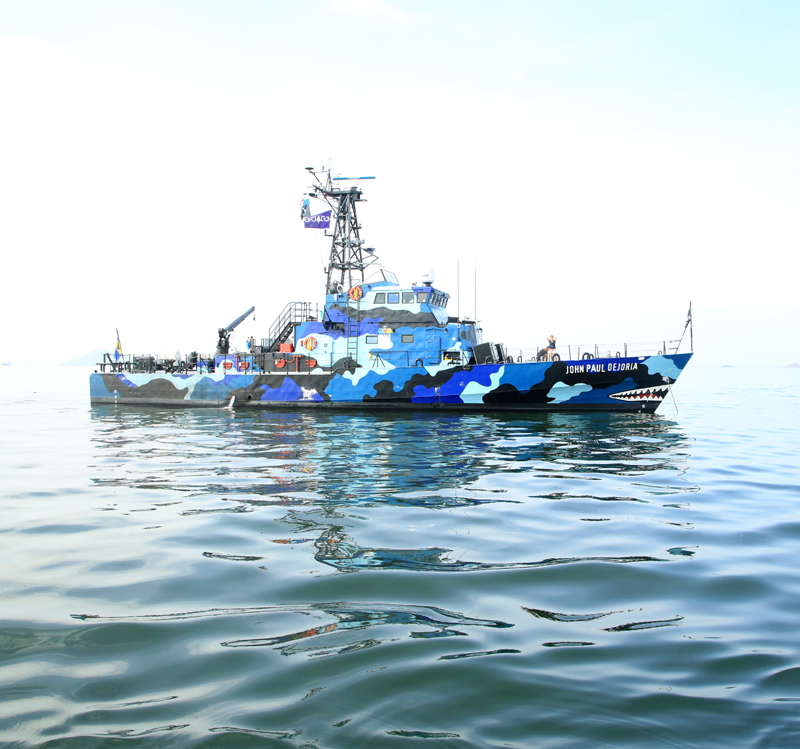
The first few days of our very first long passage together (from Panamá to the Galapágos Islands) had been great. We had left La Playita (not the best marina or the best anchorage of our lives, we agreed) and waved goodbye to the Sea Shepherd boat John Paul DeJoria.
We anchored off Contadora Island, Las Perlas, for the first night and then set off for the Galapágos. Our very first night at sea, around Punta Mala, was interesting, with really noisy rip tides and very strong currents, as well as a lot of large container ships in the traffic separation zone that we had to cross. We didn’t have much wind, and the wind we did have was erratic. It was a little stressful but nothing to write home about.
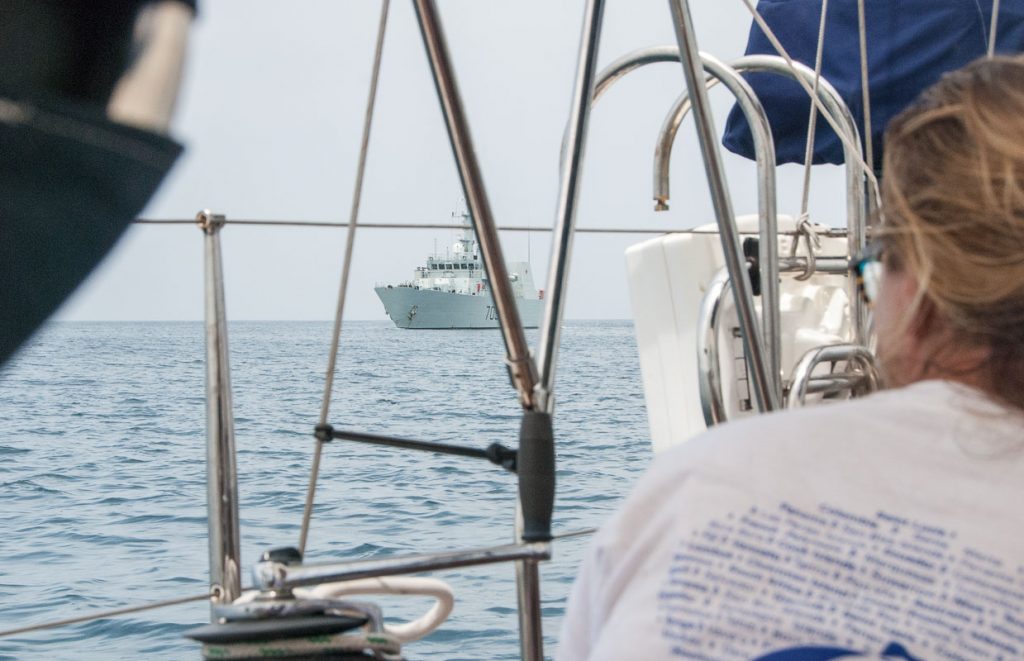
On the second day, we were hailed on the VHF by a large American naval vessel – ‘Warship 709’ – who clearly thought we were up to no good, lurking just outside the main shipping zone and not going anywhere very fast. As if! A fairly lengthy interrogation later and they explained that we looked suspicious as our AIS was not transmitting and asked us to email them if we saw any other suspicious activity, eg pangas (open wooden boats with large outboards) a long way offshore (or, presumably, 1971 Swans going very slowly), on our way down to the Galapágos. As delightful as this interaction with the US Navy was, why on earth was our AIS not transmitting?! Dietmar then spent the next three hours with his head in the wiring under the chart table, and eventually fixed the problem. Our feckless Raymarine engineer had struck again – this time with the wrong baud rate for the AIS. Wonderful.
The skies were blue and there was plenty of wildlife along the way. There was also plenty of flotsam in the water to keep our eyes peeled for, but some timely manoeuvres kept CESARINA out of harm’s way. Sometimes, she even seemed to steer herself away from trouble.
Things became interesting after we had been at sea for 3 days. The horizon-to-horizon blue skies started to give way to clouds. Fluffy and white at first, and then darker and flatter underneath. And tall. And growing as we watched…
On 7th April 2017, at midday, 440nm from the Galapagos, I wrote the following in my journal:
“Sitting in the half-light of the saloon (all the hatches are closed and the sunshades are screwed down on deck), running with sweat from anxiety as well as the 35 degree heat, watching the fruit swing listlessly in the net and listening to the rig creak and the sails flack, flack, flack in the rolling swell, I am wondering whether the grey-black thunderclouds behind us will pass to port or come directly overhead. I can smell the overripe pineapple in the net, sickly sweet in the thick air. We have 6 knots of wind – just enough to propel us very slowly forward, but not enough to counteract the undulations of the long Pacific waves on our beam. I have put the iPad and the portable VHF in the oven and hope that this will make a passable Faraday’s cage. That’s assuming that a lightning strike just fries all our electronics and doesn’t also make a massive hole in the hull, of course.
The VHF is now fizzing, as if badly tuned. Is someone trying to contact us? Or is it static electricity? There it is again…
Now the wind is rising and we are heeling. We already have 2 reefs in the main and only ½ genoa out. The wind is really starting to (here, I stopped writing. See below)
6pm
We had 30 knots of wind. And suddenly. Before we could get to the wheel, CESARINA had her toerail in the water.
“Dieetmaaaaar….”
“Bleib’ cool, darling…” and so Dietmar went out to the wheel and calmly turned us so we ran before the wind. The wind speed was the same, but CESARINA was upright again and running well. I put my hat and jacket on and went to sit in the cockpit, and then asked if I could take the wheel. I helmed, on and off for the next 5 hours. Dietmar sat with me, sometimes awake, sometimes dozing.
Now the wind has dropped again and we gave up and started motoring again ten minutes ago. Now we are making 4.4kts but at least towards the Galapagos and not north or east. Dietmar is monosyllabic and doing a crossword. I am knackered.
LATER
We sat together at the foot of the mizzen mast, lifejackets on and clipped on, for hours. It blew a steady 10-15 knots and we made some good progress. Lightning in the clouds all around us, but hardly any fork lightning and only a very little thunder, a long way away. We took turns to sleep with our head in the other’s lap. Then Dietmar decided, shortly before midnight, once the wind had completely dropped again and there was no more thunder or lightning, that we would take the sails down (they were flack-flack-flacking again), go to bed and simply let the boat drift. We checked the radar and there appeared to be nothing for at least 25 miles around so we put the radar reflector on with the alarm so that we would know if a big ship was coming. We put the anchor light on and fixed the wheel and went to bed. CESARINA gradually turned so she was beam on to the waves and gently rocked Dietmar to sleep. I, on the other hand, was still far too anxious to sleep so I went back on deck and clipped back on to the mizzen mast and tried to keep my eyes open. After a while, my eyes simply refused and I slept too, outside, fitfully, occasionally checking the plotter. I woke at 1.30am with lightning overhead and woke Dietmar who then took the watch. I slept below for an hour and a half and then made Dietmar a ‘nest’ in the cockpit from blankets and cushions and he is now asleep here beside me. Lightning overhead. Again, I have that taste of fear and electricity in my mouth. We are in the thick of the ITCZ and the wind direction and speed only gives us limited options. I’d be lying if I said I was enjoying this.
8th April 2017. 4pm.
Awful night, terrible morning today but all better now – well, a lot better anyway. I gritted my teeth and eventually just got on with it last night. I prayed to everything and everyone I could think of, and felt extremely small and insignificant. Clearly, though, it wasn’t my time last night. And I know it can be worse, but it was a combination of the boat movement (catamaran sailing is whole different thing) that is making me feel quite sick, a lack of sleep, a grumpy captain (mostly with me, probably), the constant sail changing or motoring, and a life-long fear of storms. It all adds up, it seems. I don’t remember the last time I felt so scared.
It’s now 4pm and we have hardly seen the sun today. We haven’t seen or heard another boat for days, not even a manky fishing boat. I hand-steered through a squall earlier but we decided to motor hard through this one. Dietmar has gone to bed. We don’t seem to be making much headway though – the sodding thing is either moving with us or growing, but either way I can see on the radar that it’s still 5 miles in every direction to get out of it. The rain is absolutely sheeting down outside and it’s blowing 15 – 25kts. Every hatch is closed. I’m sitting at the chart table, running with sweat, happy that I can mostly hear the engine and hardly the thunder. Which way is out?”
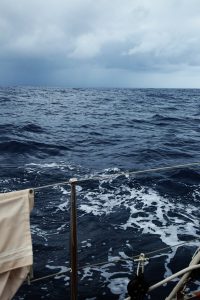 Even before I started sailing, I had heard that sailing is the best and the worst of life. Someone told me that sailing is long periods of boredom, interspersed with moments of absolute bliss and absolute terror. I don’t agree with the boredom part of that statement, but I concur with the rest. I knew this already, from my previous Atlantic crossings and Biscay experiences. This, though, was different for me. I am aware that it reads more like The Famous Five than Patrick O’Brien, but I was properly frightened on this passage down, almost permanently for about three days as we sailed through lightning and thunder in the ITCZ. If we weren’t under a storm cloud already, I was keeping a sharp lookout for the next one.
Even before I started sailing, I had heard that sailing is the best and the worst of life. Someone told me that sailing is long periods of boredom, interspersed with moments of absolute bliss and absolute terror. I don’t agree with the boredom part of that statement, but I concur with the rest. I knew this already, from my previous Atlantic crossings and Biscay experiences. This, though, was different for me. I am aware that it reads more like The Famous Five than Patrick O’Brien, but I was properly frightened on this passage down, almost permanently for about three days as we sailed through lightning and thunder in the ITCZ. If we weren’t under a storm cloud already, I was keeping a sharp lookout for the next one.
Sometimes we had less than 2 knots of wind. I understand now why so many sailors have been driven crazy by the Doldrums. Stifling heat, a lolloping boat in the beam seas, sails flapping listlessly, no wildlife, no other boats, nothing. Just the two of you , with your thoughts, on a little boat in an enormous ocean. And then, occasionally, huge thunderclouds rise up before you and behind you, and before you know it, you are pelted with rain and all of a sudden there is almost too much wind and plenty of electrical activity all around your tiny little boat. And then, shortly after the wind rises, it falls away again. And you wait under the thunderstorm.
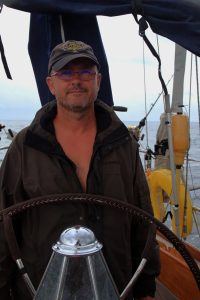
And you wait, knowing the wind will come again. And in the meantime, you roll helplessly in the swell. And you take the sails down. And then you put them back up again. And down again. And up again. Or – on a modern boat – you start the engine and burn precious diesel and do the maths each time to see whether running the engine now will leave enough fuel to get into port later. And you try to figure out which way to go to find the current, find the wind, get away from the storm, get some sleep…
Dietmar did his best to help me. He tried to explain at least 100 times that the lightning in the clouds posed no threat to us, and that it was only thunder that was a problem. Often, helpfully, the clouds chose that precise moment to give us a solo from the percussion section. Knowing logically that I was probably disproportionately scared didn’t really help. Neither did the completely truthful statement that it can get a lot more scary than this with big winds and big waves. Just what I wanted to hear. I didn’t know whether to lie down or run around (tricky on CESARINA, I expect. I didn’t try that in the end). Dietmar suggested at one point that I might like to fly home from the Galapágos (obviously not immediately as we were still over 200 miles away…). To be honest, I considered it for a second. I was really not having a nice time at all, and I started to think about my family at home and how relieved they would be if I flew home (my mother, in particular, really worries. I can’t think where I get it from…) I thought about going back to work and how happy that would make a lot of people. I felt waves of guilt about being away and doubly awful because I wasn’t even enjoying myself. The boat movement meant that I could stand my watches but the galley was deeply unattractive to me and I also had no appetite. This meant that my usefulness on board was pretty limited and Dietmar, despite being very patient with me, had probably also just about had enough. But, if I abandoned ship in the Galapágos, this would have meant he would probably have had to sail her alone on to the Marquesas – after all, where on earth could you get good crew in the Galapágos? A solo Pacific crossing was definitely never part of his plan. If I left the boat, I would be abandoning Dietmar and shipwrecking his dreams as well. There was no easy solution and, like many aspects of sailing, often there is no one you can call for a quick fix. I had created this problem (not intentionally, obviously), but I was also the only person who could fix it. Some tears and soul-searching later and I decided not to abandon my captain, but to take a little more control of myself instead. (If I end up flying home from the Marquesas, you’ll know that my plan didn’t work! However, please cross your fingers and pray to your god and to Neptune that it does!)
The skies cleared up after another couple of days and we crossed the equator on 10th April. We both spent some happy times being a little creative and I made a crown and a trident and some fishes and starfish and seaweed for my King Neptune. A slug of best St Lucian rum for me, the captain and one for Poseidon. Thank you for looking after us.
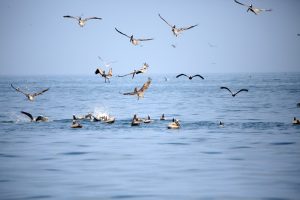 The worst of times are, as you see, also juxtaposed with the best of times. A mirror-calm blue ocean, all the way to the horizon so that you can see the roundness of the earth (uncanny). Dolphins and whales and sharks and a myriad of seabirds. An ibis cadging a lift for 100 miles or so.
The worst of times are, as you see, also juxtaposed with the best of times. A mirror-calm blue ocean, all the way to the horizon so that you can see the roundness of the earth (uncanny). Dolphins and whales and sharks and a myriad of seabirds. An ibis cadging a lift for 100 miles or so. 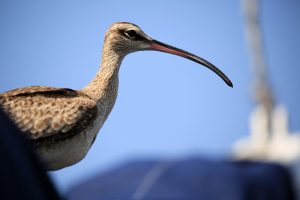 Pelicans divebombing and popping back up to the surface with a beak wriggling-full of fish. Gulls in residence on enormous floating logs. Clear blue skies and enough wind to slide through the azure seas, leaving nothing but a foamy white wake behind us. Wrapped in the arms of the man you love, wide-eyed at a sky so full of stars, it doesn’t seem possible. Fresh coffee in a morning breeze. A proud smile from your captain when you have learned something new and done it well. Feeling more alive than ever. And the sight – and the smell – of land. These are the rewards after long days of horrible weather and slow sailing. These are the things I’m not ready to surrender…
Pelicans divebombing and popping back up to the surface with a beak wriggling-full of fish. Gulls in residence on enormous floating logs. Clear blue skies and enough wind to slide through the azure seas, leaving nothing but a foamy white wake behind us. Wrapped in the arms of the man you love, wide-eyed at a sky so full of stars, it doesn’t seem possible. Fresh coffee in a morning breeze. A proud smile from your captain when you have learned something new and done it well. Feeling more alive than ever. And the sight – and the smell – of land. These are the rewards after long days of horrible weather and slow sailing. These are the things I’m not ready to surrender…

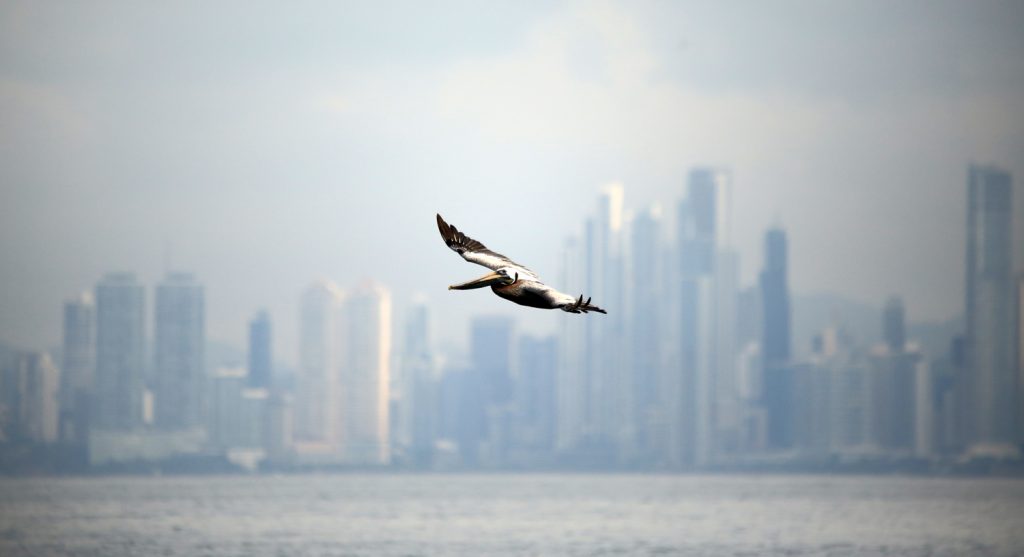
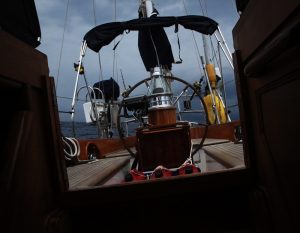
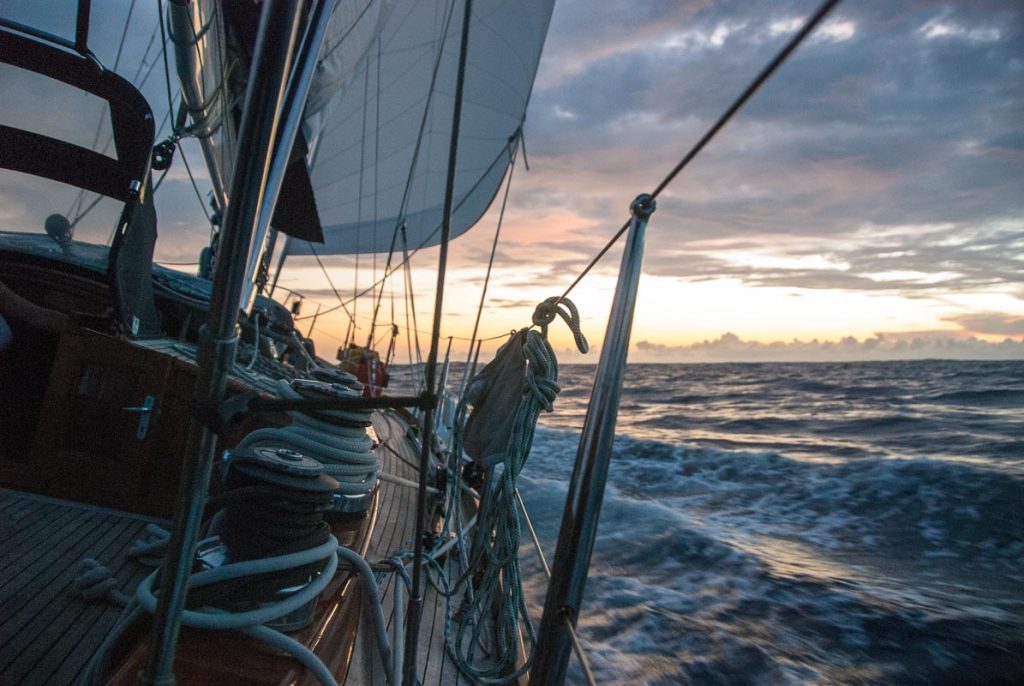
High Sailors,
Your discription explaniert and named situations, normal men and Girls will never know in their life, go ahead to the habour and take a rest.
Cheers Hans
I thought I was clipped on alongside you Em, brilliantly described, I could smell the air. I can’t tell you how vicariously I living this journey, so because I need the next instalment, you have two options – don’t come back yet or invite me over ??
Love you xxxx
Oh my days Em, thank you so much for sharing that. I was there (well thankfully not really, as I am bone dry and not sweating!) so you little travel writer/blogger what next? Extraordinary, exquisitely written, please give us more…..I love you Em xxx